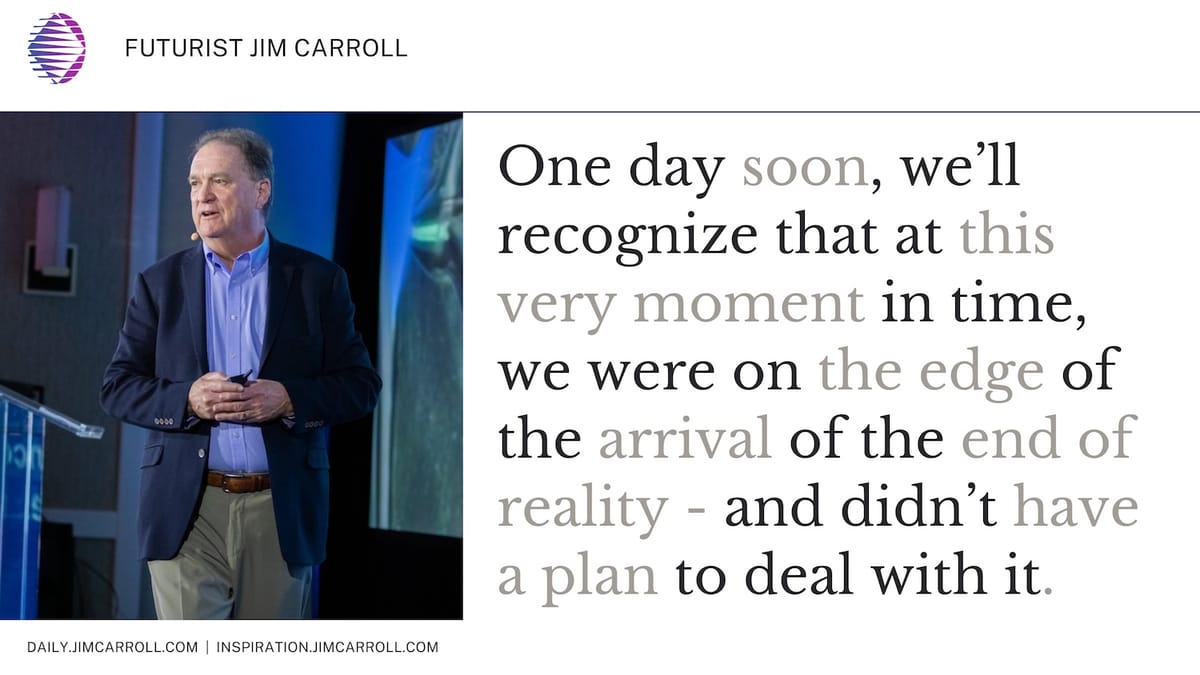"One day soon, we’ll recognize that at this very moment in time, we were on the edge of the arrival of the end of reality - and didn’t have a plan to deal with it" - Futurist Jim Carroll
So this happened.
You can scan to about 0:28 on the timeline for the actual incident - with the whole thing being captured automatically on 4 of the cameras on the car when it happened back on February 4. A Tesla Model 3 actually has 8 cameras though - and so I filled out the form on the Tesla site to get additional details of the crash, and received back this video, among a rather massive data set concerning the crash. (You can see data where the sensors seem to be considering whether to deploy the airbags or not.)
The good news is that both Christa and I are OK - no injuries. The bad news is that the cost to fix it came to $24,000 - indicative of the massive complexity of today's automobile. The good news is that this cost was covered by insurance. The bad news? It took months to fix the damage. The good news is that I finally got the car back last week. The bad news for her is that she was found to be at fault.
The good news is that I found adequate insight through the entire saga to feed into several keynotes over the last few months.
For example, I was the opening keynote for the Verisk Fraud Management Summit in Houston and had been thinking quite a bit about the potential role of the misuse of artificial intelligence in the world of insurance fraud - and the incident gave me the perfect foundation to build a story around new, emerging risk. Going in, I was aware that the insurance industry has long been in the midst of a massive battle against the 'bad guys' - the sophistication and complexity of the actions undertaken by those defrauding the industry have accelerated at a furious pace, often aided by accelerating technologies. Add AI into the mix, and we are into a vastly new, complex, and more challenging world.
I worked to put this into perspective - first, by sharing the video of the accident on stage, noting that this new complex world where videos of an accident are automatically captured is leading to unique skills and competency challenges in the industry. Watch it - in our case, the insurance adjustor assigned to the case was rather out of his league, not even thinking to ask if I might have had a video of the accident. He initially deemed me to be at fault, until we rather abruptly pushed back, realizing that he had not even done a cursory review of the details of the accident - a rather staggering level of incompetence.
How can the industry deal with accelerating fraud as a result of AI if it has a fundamental skills issue such as this at hand?
What is the potential risk of new forms of fraud? I challenged the room of senior executives to understand how quickly new AI text-to-video technology is coming about - such that in perhaps just a few short years, fake video of such an incident could be easily generated.
And then, I took them down the path of where this might all eventually end up - the fact that we are on the edge of the era of the end of reality with artificial intelligence. In that context, the very idea of identifying fraudulent insurance cases might become next to impossible - particularly when the competence of the insurance adjustors in place is already questionable.
This is but one industry - every single industry will be impacted by the 'disappearance of reality.' You might get the idea that I am somewhat concerned about this fact, nothing my comment from the stage:
"I don't know about you, but this kind of freaks me out!"
I've had quite several talks where I've been speaking about the fast-emerging risk of all the challenges that come with AI, and I can easily conclude that few executives in major industries truly understand the scope of the challenge, and how to prepare. In this case, we've got an industry where an insurance adjustor barely understands the nature of the incident that is being dealt with - and the fact that it was automatically recorded through multiple cameras. How is that individual going to be able to identify and assess a potentially fraudulent situation based on the generation of false data via AI?
I don't know about you, but all this kind of freaks me out!
What do we do about it? You need to pick up the pace in understanding the vast challenges of our new world, the speed with which they are coming at us, and what you need to do to begin to prepare for that reality (or lack thereof!)
Futurist Jim Carroll considers himself very fortunate that the accident was not worse than it was.

